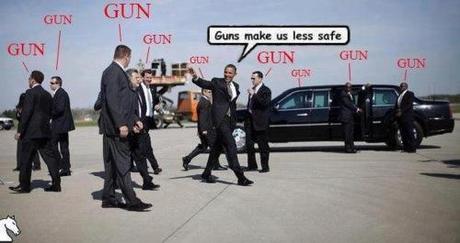
Is the Obama regime going for gun control via an international treaty that was just passed in the United Nations (UN)?
David Sherfinski reports for The Washington Times, April 2, 2013, that the UN General Assembly today approved by a 155 to 3 vote, the long-debated United Nations Arms Trade Treaty (ATT) — a sweeping, first-of-its-kind treaty to regulate the international arms trade.
The Obama regime supported the final draft of the ATT. Iran, Syria and North Korea voted against it.
The ATT requires countries to regulate and control the export of weaponry such as battle tanks, combat vehicles and aircraft and attack helicopters, as well as parts and ammunition for such weapons. It also provides that signatories (countries who approve of the treaty) will not violate arms embargoes, international treaties regarding illicit trafficking, or sell weaponry to countries for genocide, crimes against humanity or other war crimes.
But American gun rights advocates say the treaty is riddled with loopholes. Especially troubling is the treaty’s inclusion of “small arms and light weapons” in its list of weaponry subject to international regulations. They do not trust U.N. assertions that the pact is meant to regulate only cross-border trade and would have no impact on domestic U.S. gun laws and markets.
Critics of the treaty were heartened by the U.S. Senate’s resistance to ratifying the document, assuming the POS even sends the treaty to the Senate for ratification, which of course is required by the U.S. Constitution. In its budget debate late last month, the Senate approved a non-binding amendment opposing the treaty. The amendment is the brainchild of Sen. James M. Inhofe (R-Oklahoma), and has the support of all 45 Republican senators as well as 8 Democrats.
Sen Inhofe notes that the ATT could “disrupt diplomatic and national security efforts by preventing our government from assisting allies like Taiwan, South Korea or Israel when they require assistance.”
Sen. Jerry Moran (R-Kansas) made an eminently sensible point when he points out that passing a treaty Iran, Syria and North Korea will just ignore will only serve to constrain law-abiding countries like the U.S. In other words, Moran is invoking an international variant of “If guns are outlawed, only outlaws will have guns.”
Both Inhofe and Moran also argue that the Arms Trade Treaty violates our Constitutional rights, vowing that if the Obama regime supports the treaty — as appears to be the case — “members of the U.S. Senate must continue to make clear that any treaty that violates our Second Amendment freedoms will be an absolute nonstarter for ratification.”
Groups in support of the ATT include Amnesty International and the American Bar Association. The latter released a white paper arguing that the treaty would not affect Second Amendment rights.
Read the rest of the Washington Times article here.
Indeed, according to an analysis of the ATT by the Heritage Foundation, the treaty has at least two major flaws:
- The treaty is impractical because it’s unenforceable: By seeking to regulate everything from manufacturing technology to ammunition to small arms to aircraft carriers, the treaty’s scope would be so wide, any effort to honestly assess whether signatories are upholding it would be an exercise in futility. It will provide endless opportunities for activists to demand additional treaties and regulations when the contemplated treaty fails to work.
- The treaty poses a serious risk to our Second Amendment gun rights. For example, the treaty requires signatories to “take all appropriate measures to prevent the diversion of exported arms into the illicit market,” which could be held to require internal controls on the civilian transfer and sale of firearms. That, in turn, can lead to restrictions on the sale and transfer of guns within the United States.
~Eowyn

